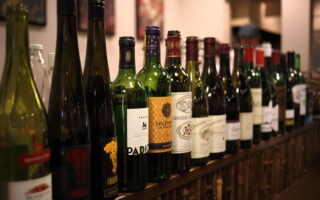The Paris Metro 40th Anniversary Issue: The Book About Paris Yesterday
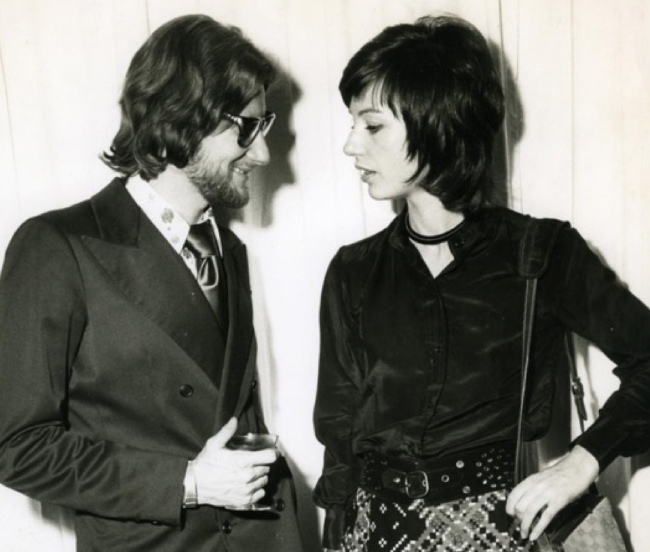
- SUBSCRIBE
- ALREADY SUBSCRIBED?
BECOME A BONJOUR PARIS MEMBER
Gain full access to our collection of over 5,000 articles and bring the City of Light into your life. Just 60 USD per year.
Find out why you should become a member here.
Sign in
Fill in your credentials below.

Yves Saint Laurent and Mary Russell, as seen in Mary Russell’s photo essay in “The Paris Metro”
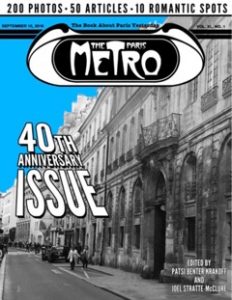
The Paris Metro
Between June 1976 and December 1978, a fortnightly English-language magazine called The Paris Metro made quite the stir. To quote Lex Hames, the author of the election thriller All Fall Down: “What could be more wonderful than being in Paris in 1976 when revolution was brewing and rebellion was in the air and you were young and the Seine was flowing and all of Paris was laid out for you like – as you know who said – a moveable feast? Well, only one thing. Being there to write about it. In 1976, Joel Stratte-McClure, Tom Moore, Harry Stein, and several other young American writers of undoubted courage and possibly excessive zeal, started up an English-language magazine in The City of Light called The Paris Metro.”
To celebrate the now-defunct magazine, a brand new book has been released– and it’s free for download. The Paris Metro 40th Anniversary Issue: The Book About Paris Yesterday includes 50 original anecdotes, memoirs, reflections and vignettes written by former staff members, writers and readers of The Paris Metro. Featuring 200 full-color illustrations and extracts published in past issues, the book remembers a glorious time. Go to http://theparismetro.com/download/ and you’ll have the option of either downloading the PDF or viewing the book online.
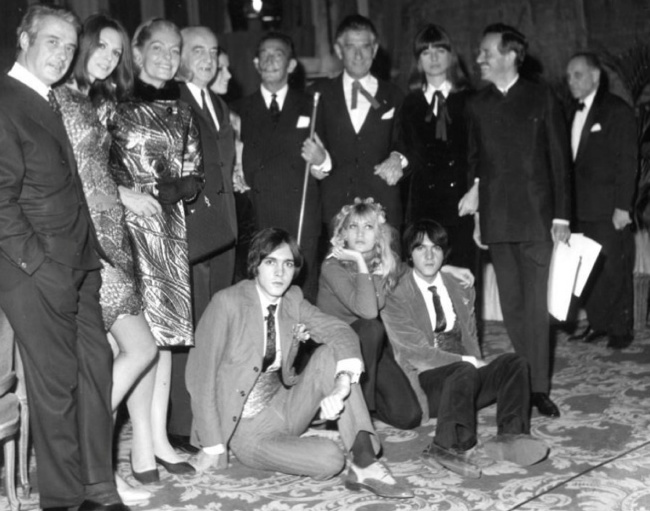
Salvador Dalí at the Hôtel Meurice, as seen in Mary Russell’s photo essay in “The Paris Metro”
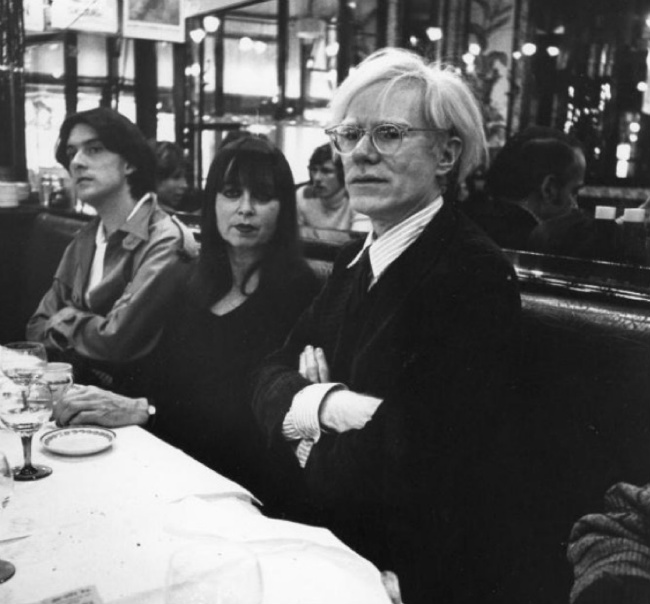
Andy Warhol at the Café de Flore. Photo: Mary Russell, as featured in “The Paris Metro”
Below, we share an excerpt from the book: “Parlez-vous French?” by Harry Stein.
Whenever I get around to talking about my days at The Metro, invariably the question arises: How good was your French?
I’ll usually answer something along the lines of “Good enough to get by,” which it almost always was.
Except, that is, at French-only dinner parties. There my problems usually began about five minutes in, when the adjectives and adverbs and especially the verbs began flying without context. There are a LOT of strange verbs in French – like écailler, to flake, or cover a dome with scale-like plates; or pantoufler, to act or talk in a silly way. Certain French people, in their depthless insecurity, live to impress others by dropping them all, pantouflering, as it were, all over the place. Alas, even in high school, French verbs were my Waterloo. On such occasions I was apt to lose the thread of the conversation pretty much as soon as it began.
The trouble was never my accent which, so I’m told, was, at minimum, a solid B-plus. I’d learned early on to convincingly roll my R’s and, even more important, mastered some of the subtler traits of native speakers, like slurring certain words, or pursing my lips in disapproval while listening to someone of whom I disapproved, or, in response, blowing them out in distain. More than once, early in a conversation, it was clear the person to whom I was talking thought I, too, was French and then, picking up some odd mispronunciation that proved I wasn’t, couldn’t quite place where I was from. My friend Dominique, never one to mince words in any language, once told me I sounded like a very confident retarded person.
In any case, by the time we launched The Metro, my French was a helluva lot better than it had been five years earlier when, fresh out of journalism school, I first came to Paris as a freelancer. Through a lucky connection, I managed to snag an interview with General Jacques Massu, former commander of French forces in Algeria, which I quickly parlayed into an assignment for the International Herald Tribune. Massu had just published a memoir, where he readily acknowledged he’d used torture as one of the “necessary measures” to break the rebellion, and it had set Paris in an uproar, with students demonstrating in the streets and editorialists demanding he be tried as a war criminal.
The upside? Since Massu was refusing to cooperate with the French press, mine would be the sole — and definitive — story. The downside? My lousy French.
In the couple of days before the interview, I laboriously made my way through Massu’s book, a French-English dictionary at the ready, composing a list of questions. But more importantly, I signed on as a wingman my fully bilingual friend Barbara, who would, at my signal, step in to incisively challenge Massu’s more outrageous claims. For where I was limited to the basics — torturer, blesser — in a pinch, she could whip out the verb for “to administer electric shock to the genitals.”
Then came reality. Massu’s office was in Les Invalides, with its magnificent façade and imposing gold dome, and by the time we’d marched down a gleaming hallway a quarter mile long, past rifle-bearing soldiers snapping to attention to reach the tough-as-nails general, we were feeling all the confidence of luckless nobodies being trundled to the guillotine.
I set my tape recorder on his immense desk and took my list of questions from my pocket.
“General, vous dites dans vôtre livre…” “General, you say in your book that you used every means at your disposal against the Algerian rebels. How do you justify this?”
“Il faut comprendre…” he unhesitatingly replied, his voice deep and sonorous, so he sounded more like he was reciting Shakespeare than answering my stupid, obvious question: “You must understand what we were dealing with. Our job was to apprehend killers. This was a good thing. When one apprehends killers, one reassures the population.”
I glanced expectantly at Barbara for a follow-up. But, frozen in terror, white knuckles clutching the armrests of her chair, she avoided my eyes.
So I looked down at my list and asked my next carefully worded question. “General, there are those who say the use of torture…”
“I do not use that word,” he interrupted, not angry but emphatic. “The opponents of the military have used the word ‘torture’ to blacken the name of the army. I printed objectively what happened.”
From here, Massu pretty much took command of the interview.
It was the other side, he said, that was barbaric, bombing marketplaces, killing civilians indiscriminately. It was to them the epithet ‘terrorist’ applied. His was the right side, the moral side.
Again I looked toward Barbara; there was a better chance she’d topple over with a coronary than come to my aid.
I guess I could’ve jumped in myself, but to say what? “Non, monsieur, ce n’est pas vrai! Tortuer, ce n’est pas bon!”
Instead, I looked down at my pad and asked my next carefully composed question.
Afterward, back in my cramped studio apartment, as I slowly translated and transcribed the tape, I was in despair; Massu seemed even more outrageous the second time, and my non-replies even more glaring.
Fortunately the human mind is a wondrously resourceful thing, and by the end of the day I’d convinced myself it wasn’t so much of a problem, after all. What he’d said was so monstrous, I didn’t need to challenge him, because he hung himself with his own words. So that’s how I wrote it up, and that’s how the Trib ran it, placing it on the back page, the slot reserved for the most important feature in that day’s paper. Then the letters started pouring in. They can readily be summed up: What was wrong with your idiot reporter? Why was Massu allowed to say these things without a word of contradiction?
Happily I never had to endure anything like that during the Metro years. Certainly in interview situations, I was always comfortably in control.
There was just one dark day: the SYMPOSIUM!
The event focused on the French press — specifically, how lousy it is — and it was aimed at promoting our hot-off-the-press treatment of the subject. Under my direction, we’d had three reporters on various aspects of the story, with particular focus on what was known as the de Broglie Affair; a scandal that should have been the French Watergate, but because of the constraints under which the French media operate — as our subhead had it No Time, No Money, No Guts — was not.
As masochistic and self-absorbed as journalists everywhere, the local press ate it up. Never mind that they themselves were the target, here was more evidence of these brash young Americans’ fearlessness and pluck!
And — speaking of masochistic and self-absorbed! — in a flash of inspiration, it hit me that a symposium could only generate more favorable attention.
I quickly put together a panel of distinguished veteran journalists who’d been featured in our piece, among them Charles Gombault, the co-founder of France-Soir, and the equally celebrated Michel Gordey of L’Express. And who should serve as moderator? The obvious choice: moi.
It was not until the discussion started that I thought to question the wisdom of that decision. The audience was large, and full of cultural heavyweights, and as the never-before-heard verbs started flying — and, worse, the references to obscure figures and fifty-year-old events — I started to sweat. I tried to keep up for a while, then realized there was no way. The mind wandered — to old girlfriends, to the lineup of the ’57 Milwaukee Braves. Anywhere to escape this nightmare.
Only when there was a pause, would I snap to attention, nod, and say something along the lines of “Ah, bon.”
It was like the most gruesome dinner party ever. To this day, I can’t say for certain that anyone noticed, though it seems impossible no one did. On the other hand, it also seems impossible that a roomful of French journalists would have been so polite that no one would mention it. I’m pretty sure that at the very least, there was some serious behind-the-back sniggering.
The worst part? In a crucial way, this was not like those dinner parties. Like an idiot, I threw this one myself.
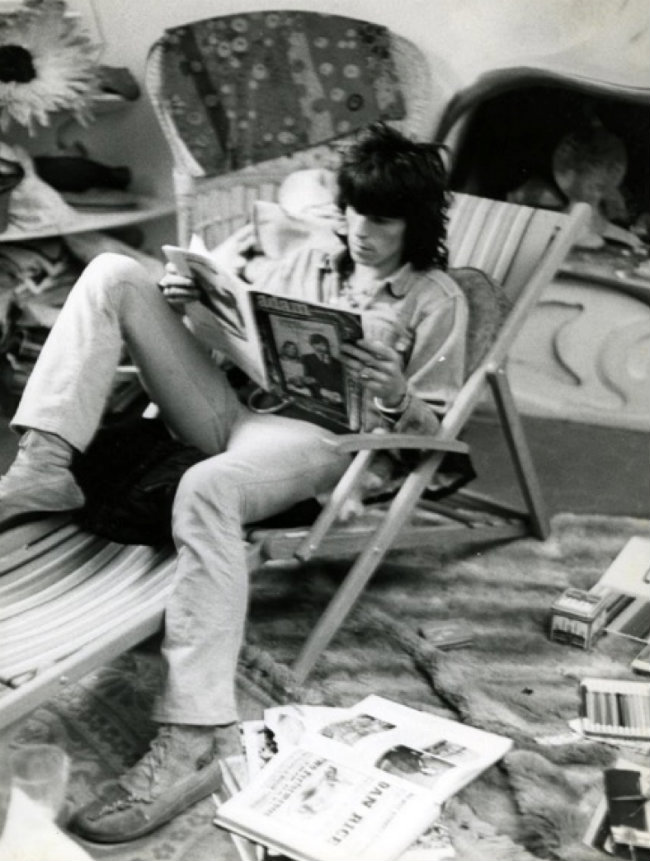
Keith Richards & Mick Jagger would
hang out at Catherine Harlé’s model
agency. Photo: Mary Russell, as featured in The Paris Metro.
Lead photo credit : Yves Saint Laurent and Mary Russell, as seen in Mary Russell's photo essay in "The Paris Metro"


